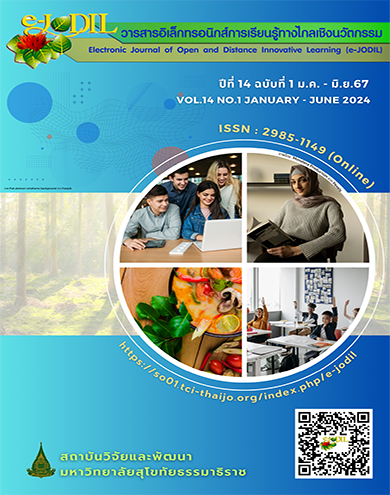Social Causal Factors and Online Media Discrimination that Affect Narcotics-related Offenses of the Children and Juveniles
Main Article Content
บทคัดย่อ
This research aims to study causal social factors, online media discrimination factors, and narcotics-related offenses of children and juveniles and to analyse factors that affect narcotics-related offenses for children and juveniles. The samples were 329 children and juveniles selected by an accidental sampling technique. Research instruments were a set of questionnaires on Causal Social Factors that had their reliability indexes between 0.866 and 0.933 and another set of questionnaires on online media discrimination factors that had their reliability between 0.866 and 0.933. Multiple Regression analysis with the Stepwise Technique was used for data analysis. The findings were as follows: 1) The practices on causal social factors and online media discrimination factors were high. The practices on narcotics-related offenses for children and juveniles were at moderate levels. 2)Factors affecting narcotics-related offenses of the children and juveniles were family relationships and parental upbringing. Both could share their effects to predict narcotics-related offenses for children and juveniles by 3.9% (R2 = 0. 039) and were statistically significant at 0.01. They could be shown in the following formula:
Narcotics-related offenses of the children and juveniles = 0.1.748 + 0.560 (Family Relationship) -0.361 (Parental Upbringing)
Downloads
Article Details

อนุญาตภายใต้เงื่อนไข Creative Commons Attribution-NonCommercial-NoDerivatives 4.0 International License.
บทความ ข้อความ ภาพประกอบ ตารางประกอบ ที่ตีพิมพ์ในวารสารเป็นความคิดเห็นและความรับผิดชอบของผู้เขียนแต่เพียงผู้เดียว ไม่เกี่ยวข้องกับมหาวิทยาลัยสุโขทัยธรรมาธิราชแต่อย่างใด
บทความที่เสนอพิจารณาในวารสาร e-JODIL ต้องเป็นบทความที่ไม่เคยส่งไปลงพิมพ์ เผยแพร่ หรืออยู่ระหว่างการพิจารณาของวารสารอื่น
กองบรรณาธิการขอสงวนสิทธิ์ในการพิจารณาและตัดสินการตีพิมพ์บทความในวารสาร
เอกสารอ้างอิง
Adivadhanasit, C., Sudsawat, S., Rerkrujiphimon, C., Wiriyasombun, P., Piromkaew, S., & Petcharapa, S. (2009). Sociology. Bangkok: Kasetsart University Press.
Areekul, W. (2018). Violence in Adolescents and the Media. Retrieved August 15, 2018, from http://www.teenrama.com
Cheuchat, N., & Laeheem, K. (2011). Juvenile Delinquency. In 2nd The National SMARTS Conference (pp.337 - 355). Bangkok: Kasetsart University.
Chutrakul., S. (2016). Digital Literacy, Digital Natives and Family. Journal of Management Science Chiangrai Rajabhat University, 11(1), 99-118.
Kakai, C. (2019). The Influence of Online Social Media on Deviant Juvenile Behavior in Bangkok. Journal of Social Work, 27(2), 194–227.
Khandee, P., Treemek, J., & Putrakul, K. (2018). Criminological Theory: Principle, Research and Policy Implication. Bangkok: S. Charoen Printing.
Khanthasak, F. (2010). Causes of Juvenile Delinquency and Juvenile Delinquency Process under the Juvenile and Family Court Act and Judicial Procedures for Juvenile and Family (Master's thesis). Faculty of Political Science, Prince of Songkhla University, Pattani Campus. Pattani.
Khumkom, S. (2009). Family Communication Patterns as Perceived by Juvenile Delinquents and Non-Delinquents in Bangkok Metropolitan (Master's thesis). Chulalongkorn University. Bangkok
Klapper, J. T. (1960). The Effects of Mass Communication. New York: The Free Press.
Nokdee, C. (2020). "Thai Children" Know How to Protect Themselves from Online Media Dangers. Retrieved January 9, 2020, from http: www.thaihealth.or.th
Office of the Basic Education Commission Ministry of Education. (2014). Handbook on the Protection and Assistance of Schoolchildren.Bangkok: Agricultural Cooperative Printing Demonstrations of Thai co., Ltd.
Office of the Secretariat of the House of Representatives. (2017). Report of the National Reform Steering Assembly on Mass Communication on Education Results and Suggestions for Reforming the Use of Social Media (Social Media). Bangkok: Office of the Secretariat of the House of Representatives
Ministry of Justice. (2018). Office of the Narcotics Control Board Emphasizes that Posting a Picture, a Message of Buying and Selling Addictive Substances through Social Media is Illegal. Retrieved Nov, 2018, from https://www.moj.go.th/view/12078
Morgan, M. (2009). Cultivation Analysis and Media Effects. In Nabi, R. L., & Oliver, M. B. (Eds.). The Sage Handbook of Media Processes and Effects. Los Angeles: Sage.
Phurisinsit, W. (1988). Offenses of Children and Youth: A Sociological Concept. Bangkok: Odeon Store Publishing.
Puranapanya, N. (2015). Factors Affecting Juvenile Delinquency in Respect of Addictive Substance Offence: A Case Study of Burirum Province (Master's thesis). Graduate School, Rangsit University. Phatumtani.
Ratvitayakron, S. (2010). The Culpability Performs Components of Children and Youth in The Observation and Protection Center at Chonburi Province. Journal of Politics, Administration and Law, 2(3), 161-191.
Reid Chassiakos, Y. L., Radesky, J., Christakis, D., Moreno, M. A., Cross, C., Hill, D., ... & Swanson, W. S. (2016). Children and Adolescents and Digital Media. Pediatrics, 138(5).
Schafer, S., & Kundton, R. D. (1980). Juvenile Delinquency. New York: Random House.
Somjing, J. (2014). The Media and Information Literacy with Deviant Behaviours of Youths at Risked in Trang (Master's thesis). Department of Communication Arts and Information, Kasetsart University. Bangkok.
Sophonphongphat, P. (2017). The Factor of Online Media on Violent Behavior and the Offense Culpability of Children and Youngsters in the Observation and Protection Center in Bangkok and Perimeter. Bangkok: Chandrakasem Rajabhat University.
Thai Health Promotion Foundation. (2020). Thai Children Are Aware of the Dangers of Online Media. Retrieved Mar 15, 2020, from https://www.thaihealth.or.th/


